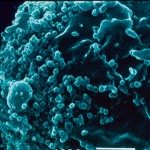Lien vers Pubmed [PMID] – 24366517
Immunol. Cell Biol. 2014 Mar;92(3):256-62
Natural killer (NK) cells are important in innate immunity, first described as guardians for the detection and clearance of transformed or virus-infected cells. Later, this cell type was revealed to be also able to recognize and respond to bacteria-infected cells. NK cells possess receptors allowing them to sense and respond to viral and bacterial patterns, including Toll-like receptors (TLRs). Initially described in other innate immune cells, particularly monocytes/macrophages, TLRs have more recently been characterized in NK cells. Controversies remain regarding the TLR expression in NK cells and their responsiveness to agonists, specifically the requirement for the presence of accessory cells, such as dendritic cells, or of accessory cytokines (IL-2, IL-12, IL-15 and IL-18) to respond to TLR agonists. Upon TLR activation, NK cells are an important source of IFN-γ and granulocyte macrophage colony-stimulating factor, cytokines necessary to fight infection but that can also contribute to deleterious inflammation if produced in excessive amounts. Here, we review the current knowledge concerning the expression of TLRs in and on NK cells and the responsiveness to their agonists and review the literature on the role of NK cells in the sensing of bacterial or viral patterns and in combatting infection.

